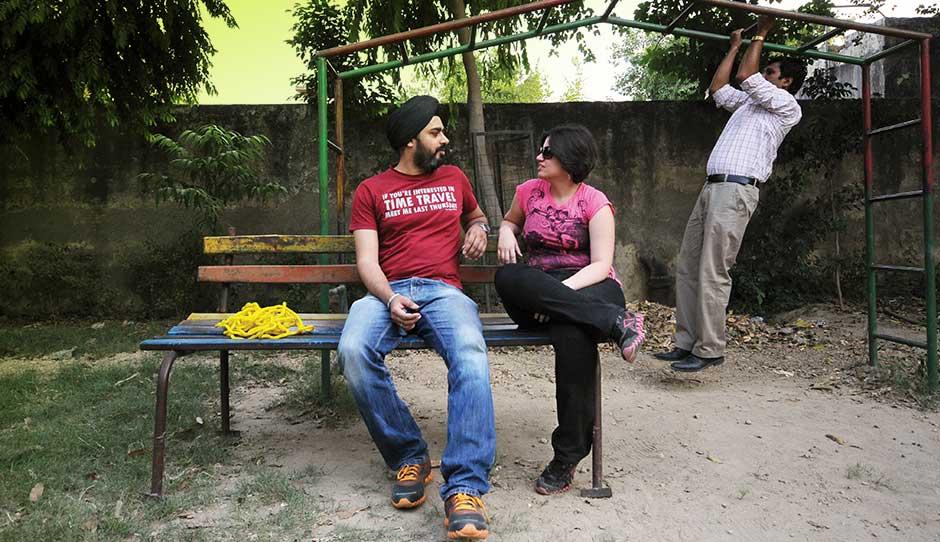How MobiKwik's Power Couple Strikes a Fine Balance
- BY Sonal Khetarpal
 In
In  18806
18806 0
0

Before Bipin Preet Singh and Upasana Taku tied the knot, it was the arrow of MobiKwik that had struck them both. A mobile and web wallet company, MobiKwik allows users to make payments for products and services through a mobile app, website or SMS. Today, Singh and Taku boast of a customer base of over two million users and mobilise 35,000 transactions daily. Driven by the youthful idealism to impact people's lives, they have aspirations to become the PayPal of India. Their preference to maintain a flat organisational structure does not come as a surprise, for they love to brainstorm new and creative ideas with their team members. It’s hard to miss the fun they’re having as they build their company—sometimes, using strategies they spy in popular television series. Another thing that’s work in progress for Singh and Taku—striking the right balance between being husband and wife, and co-founders.
Upasana Taku: Our daily routine is determined by our cook. She comes to our house twice. First, in the morning around 9am and then in the evening at 9.30pm. After she has finished her chores, usually around 10am, we leave for work and we have to reach home before she comes back in the evening. If we are working late, we have to ask her to wait for those extra ten minutes.
Bipin Preet Singh: We usually reach office by 10.30am. There are no fixed working hours as such. Different teams come as per their work demands. Customer care team comes early to respond to customer queries and sales team usually come a bit late as they have to call or meet clients.
UT: In the morning, both of us make our own 'to-do' list, on the laptop or a mental checklist. It differs as both of us handle different business domains because we have dif-ferent areas of expertise. Actually, that is the reason why I joined MobiKwik in February 2010, seven months after Bipin started this venture. Even before I joined, we were good friends and I would help him with the problems, mostly related to payments. It was due to the problems in settling payments that our second venture, ZaakPay was incepted at the end of 2010. I am strong in operations and business development. This is because of my past experience at PayPal in the US. Bipin, being an engineer from IIT Delhi and having worked as a Platform Architect at Intel, NVIDIA and Freescale Semiconductor, is strong in technology and marketing.
“A start-up is all about risks. If our employees do not take any risks, the company will not make any progress.” - Bipin Preet Singh
BS: We not only have complementary skill sets, but also opposing personalities which works to our advantage. Upasana is direct and confrontational whereas I am the more diplomatic one. Many a times, I do not confront people when they are doing something wrong. To be honest, I am trying to change that.
UT: For me, it is the reverse. As our team is growing, I have realised not everyone has the same personality. There are a lot of straight shooters but, there are some soft spoken, mellow people who do not like direct feedback. I am learning to be more creative and diplomatic in my communication with them. So, in the company, I am the bad cop and Bipin is the good cop. And, both of us are trying to reach the middle ground where we can be both the personalities when required.
UT: We are not only learning to manage ourselves, but also our time. Being in a start up, we always have a lot of work on our table. In the first two years of the company, our work day was very unorganised. We did not have any strategy and would do whatever came our way. We were on a very reactive mode. Now, we don't do that. We have learnt to treat important matters first. For me, checking if all the payments are settled on a daily basis is of utmost priority.
BS: One thing I check everyday is the company's metrics—number of transactions, new users and the amount of payments settled or outstanding. On average, we do 35,000 transactions in a day. I have realised that there are two kinds of things I have to do, one is defensive—work required to keep the company running, and other is offensive—trying new things that will increase the company's revenue. It is the latter that excites me. It is the freedom and the excitement to do new things that made me leave my corporate career of seven years and start MobiKwik in 2009. But, as we are growing I have to spend more time on defence. However, I ensure, I do at least one activity everyday that will lead to our growth. We have grown from Rs5 crore in 2011 to Rs100 crore this year.
UT: In the first two years, we would invest whatever we earned. We did not even take out our salaries. But, for a start up that is trying to create a big name for itself, it was not the right strategy. In a start up, you have to invest first, and earn later. The benefits of being a leader in a space are disproportionately larger than the risk of initial investment. It is no good being No. 5. It is better to invest a higher sum to facilitate company growth and be No. 1. From 2009 to 2011, we invested Rs50 lakhs. But, in 2012 itself we have invested Rs1 crore to get more people and develop more products. This helped us grow in terms of revenue and in the number of employees as well. Uptil 2012, we were only five employees. Now, we have 34 people in our team. hile hiring, it is the persistence to work hard, and the potential to learn fast that we look for. We also consider the right mindset which is suited for a start up. We do not really look at their current skills or college. Most of our people are not from any great colleges. We do not have any IITian in the company except Bipin.

BS: To be honest, I don’t care if they even have a degree. There was one interesting incident. One of our employees with 15 years of experience decided to leave. When we asked him for reasons, he said our entire team is frustrated. He said, we throw unrealistic work goals on them and they are always under pressure. We were shocked. Both of us decided to take each employee out for lunch separately and get their feedback. Fortunately, no one complained. We realised, people who have worked in bigger companies have a very different mindset. Most of the people who left us or we had to let them go were people with eight to 10 years of experience. It was because of the culture misfit. In fact, it is the experienced people who complain about work. The youngsters actually work more and do not complain about it.
UT: In fact, most of our employees are freshers or people with two or three years of experience. Young people are idealistic. They want to make an impact on a large number of people. This is what matters most to us and we tap on that. There have been instances when some of our employees get apprehensive with the lot of responsibilities. In such cases, we have to constantly give them confidence and assurance that we are there to support them.
BS: Mistakes are a part of learning process. Our goal is to minimise errors as we make progress. If people are scared of making mistakes, they will not take risks. A start-up is all about risks. If they do not take any risks, the company will not make any progress. In fact, we have our own share of mistakes. We realised this when we all went for an offsite trip to Jim Corbett Park with our 24 employees. On the way back, since everyone was far more open after spending two days together, we asked them for what they liked or did not like. A lot of things were said. Most of the people complained that they never got the opportunity to talk to us. It was an eye opener or us. I would spend most of my time with the tech team and Upasana with the sales team. We realised as our company grows, we will have to set formal processes in place so no one feels left out. Another complain was that some people had not received their confirmation letters when their probation period ended. Too engrossed in growing the company, we did not realise how important these small things could be to our employees. After that, we hired our first “employee happiness officer”.
UT: But, the onus is still on us to keep everyone happy. Now, I try to ensure they all know clearly what their goals are and what is expected from them. I do not micromanage. I give them the timeline and let them work themselves with a usual tracking of their progress. An open atmosphere is essential to let the employee grow. Also, there are no hierarchies in our office. It just does not atter. The person who is right is right and who is wrong is wrong. The only way we establish that is through intellectual debate.
BS: There have been cases when we have fought very viciously in the office with each other. We are trying to minimise that. But, it shows our employees that just because we are married, we will not support each other. After such situations, I have to do damage control and tell our employees we are not on the verge of divorce. What I have learnt by handling our team is that the most effective manager is the one who does not seem to be managing at all. I define the parameters of what needs to be done and convince them why it is important for them to achieve it. If they see it as a challenge and an opportunity to grow, people respond very well to it. At times, they do things better than I myself could have done.
The most effective manager is one who doesn't seem to be managing at all.
UT: Apart from hiring, it is this year onwards that we are trying to acquire new customers and establish our brand. In fact, in 2010 and 2011 we worked quite hard, but only on developing our products and ignored the marketing part. Our belief was if we build an excellent product, users will discover it themselves. But, even if you have the best product in the world, it never happens. You have to find ways to talk about your product and find ways to make people talk about it. It is when we became more active in the public domain and were talking to one of the strategic partners, we realised that we were perceived to be much smaller than we actually were. So, we did a survey with our friends and asked on the number of transactions they think we do daily. The answers were 10 times smaller than the actual number. It did get our brain ticking.
BS: Now, we have a dedicated social media person who tracks all comments on MobiKwik. We even have our team of 13 people in customer care who handle the ticketing system in our website. I personally handle our company's Twitter and Facebook account. We now have a customer base of over two million customers and are adding 2,00,000 users every month.
UT: We are now looking to raise funding for the first time for MobiKwik. Prior to that, we had raised funding for ZaakPay for half a million USD from Sequoia Captial in 2011-12. Our future plan is to get to five million users by end of this year, and ultimately each a Rs1,000 crore turnover.
BS: As our company grows and all processes fall in place, I think we will have more time for ourselves. From last year, we have tried to stop working on Sundays. When we are not working, we go for movies, concerts or plays. If we are at home, we watch TV shows like CSI, Ugly Betty or Burn Notice. But, whatever we see—Betty handling her mean colleagues or the spy in Burn Notice using different strategies to get his official post back—we inevitably link it back to our company.





























Add new comment